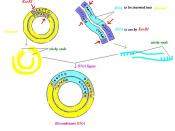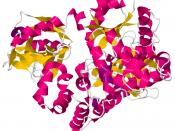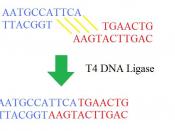- Clear, well thought out
Genetic Engineering
"Discuss the applications and techniques involved in genetic engineering. Consider the advantages and disadvantages of this approach."
Genetic engineering is an umbrella term that can cover a wide range of ways of changing the genetic material -- the DNA code -- in a living organism. This code contains all the information, stored in a long chain chemical molecule, which determines the nature of the organism. Apart from identical twins, genetic make-up is unique to each individual. Individual genes are particular sections of this chain, spaced out along it, which determine the characteristics and functions of our body. Defects of individual genes can cause a malfunction in the metabolism of the body, and are the roots of many "genetic" diseases.
In a sense, man has been using genetic engineering for thousands of years. We weren't changing DNA molecules directly, but we were guiding the selection of genes.
For example the domestication of plants and animals.
Recombinant DNA technology is the newest form of genetic engineering, which involves the manipulation of DNA on the molecular level. This is a totally new process based on the science of molecular biology, a relatively new science only forty years old. It represents a major increase in our ability to improve life. But a negative aspect is that it changes the forms of life we know of, possibly damaging our environment
It has been known for some time that genetic information can be transferred between micro-organisms. This is process it done via plasmids (small circular rings of DNA) or phages (bacterial viruses). Both of these are termed vectors, this is because of their ability to move genetic material. In general this is limited to simpler species of bacteria.
Nevertheless, this can restriction can be overcome with the use of...



Good
very scientific and thoroughly researched. Not much insight from the writer which could be a good or a bad thing depending on what you're looking for. over all a good paper
2 out of 2 people found this comment useful.